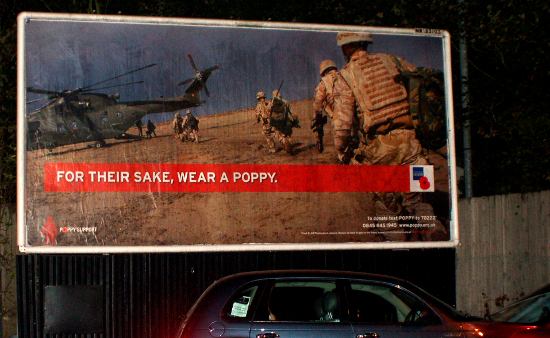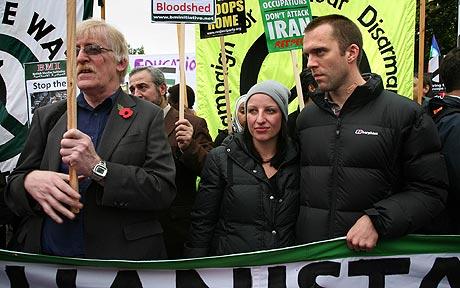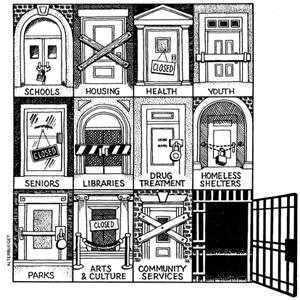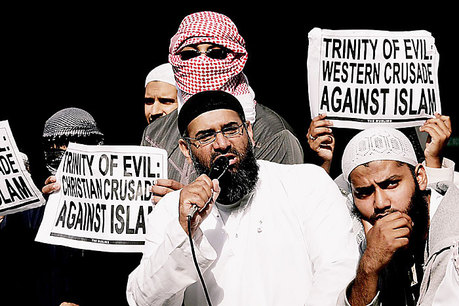A report on Indymedia UK demonstrates exactly how "the simple application of some red paper and letters cut from white paper, quickly transformed the appeal for the dead to an appeal for the living by an anonymous group armed only with PVA glue and a roller."
You will need:Before;
Six sheets of red A4 paper (try Aldi for cheap colour paper)
Five sheets of white A4 (recycled obvisously, think of the planet)
A printer (inkjet or laser)
A craft knife
A cutting board
PVA glue (water it down 1:1) or wallpaper paste
Now create a landscape word document with the letters BR'INGEMHOME (no spaces) using Arial or Helvetica at about 535 point. You'll need to set your margins to a minimum to get two letters to a page. Note you'll need to put the apostrophe with the 'I' when you print in order to fit it all on five rather than six sheets. Before you print, set the font format to outline as this will save loads of ink.
While it is printing, get your six sheets of red paper and glue them together in landscape with about 1cm overlap. Your letter should now be printed so carefully cut out the letters. If you used Arial, cut the central horizontal of your two E's a little shorter byt about 4cm to make them more like the original.
Arrange the letters on the red paper in the correct order. Obvisouly you move the apostrophe back to it's correct position now so it reads BRING 'EM HOME. Pay attention to the spacing. Each letter should be about 2cm from the other and between words the spacing is a little less than the width of a letter. When you have it correct and nicely aligned on the paper, glue the letters down.
Let it dry and now roll the whole thing on so the letter side is inside the roll. Remember which end will come out first when unrolled and which way up it needs to be held.
Now get a few mates together. You'll want two or three people at the billboard - one to unroll, one to paste and one to hold shit for the others or help stabalise whatever you bring to stand on if required). You'll probably also want a couple more people 100 yards up and down the road to act as look outs. Come up with an approbriate way for your lookouts to communicate with you, perhaps whistles or walkie-talkies or perhaps even just a yell.
When pasting, it is good to glue both under the roll and over the top to help water proof your work.
That's it. Please also take a photo and upload it.



However, those who commented on the story were of a different opinion. To take just a few of the opinions on offer that favoured the actions;
All of the comments quoted are extremely highly rated, whereas those condemning the action are very poorly rated. Given that the Daily Mail comments boards are dominated by right-wingers and conservatives, often even fascists, this is a powerful indication of just how far indignation over the war has spread.I applaud this, and I did three tours in Iraq, two in Afghanistan with 45 Cdo RM - What is far more disrespectful is the attitude of the government who send our soldiers, poorly equipped, to fight in some made-up war for no good reason.
the people are right prosecute bliar but to deface the RBL poster seems a bit crase, but because this goverment do not listen to the people. people have to resort to desperate measures.
Whilst one would usually leap to condemn such an attack, for once it is justified and frankly, this is the poster the British Legion should be putting out.
If the link in peoples minds can be created that Bliar is responsible for the death and suffering, not just of our soldiers but civilians as well, then this vandalism is justified. When we see the poppy, let us realise that it can support and condemn with equal power.Sorry, but as an ex Serviceman I do not consider it to be disrepectful to our troops, nor do I regard it as vandalism.
Many of our brave Servicemen and Women have been, and are being, killed because of lying politicians.
The least we can do to show our respect for the fallen is to honour their memory by giving them the Truth and Justice that has denied them for too long.
Anything less will render their sacrifice as a Bloody waste.
Also revealing are the messages on the Army Rumour Service (ARRSE) message boards which show that many of ex- and currently serving soldiers agree with the sentiments expressed. The most articulate comment, also rebuffing the minority who agreed with the original post against "Anti-war t**ts" [sic], was this one;
Re: Legion Posters Defaced!!!!This positive reaction went largely unreported. The Daily Telegraph mirrored the Mail's stance, as did Kent Online, whilst the BBC contained coverage of the "mived reaction" to a 30-second video clip.
Posted: Thu Oct 29, 2009 9:37 am
Author: Queensman Location: Tangier
Sorry, but I think it's brilliant! Inspired, even.
When I saw 'Legion poster defaced' I was already half on the Outrage bus ready to call for the unleashing of the hounds of hell...... But having seen the poster, first I laughed, then I nodded in agreement. Now I will make a copy and promulgate it as widely as I can.
I say these things as a member of the Royal British Legion, as a poppy collector etc etc.
I feel sorry for the family concerned, the last thing they'd want or need is to be bathed in limelight about all this - however, having lost a son because of the reprehensible Mr Bliar's duplicity, I wouldn't mind betting that they probably agree with the sentiment. If they don't, they should.
What will undoubtedly happen now is for all the 'easily offended' to completely over react and leap up and down and make an arrse of themselves as they did about that drunken prat who pished on a war memorial recently.
None of this should come as a surprise. Although a considerable segment of the public are against the war in Afghanistan, no significant portion of the decision-making sectors of society have yet turned against it as they did Iraq. Moreover, when they do, it will be for tactical reasons rather than ideological ones. That even those not well versed in the stance of the radical left are branding the war illegal sets a dangerous precedent. Demonstrating outrage over soldiers being poorly equipped to fight is acceptable discourse. Challenging the very motives and precedent of war and is not.
In line with the parameters of debate by established power, the mass media is trying to channel public outrage. Hence, the Mail recycles for another year the nonsense that "Poppy sellers from the Royal British Legion have been banned from shaking their collection tins in case they are seen as a 'public menace'." Likewise, the Telegraph report that "the Royal British Legion has been accused of offering “patronising” health and safety advice after warning poppy sellers to be careful when working in at night" is a deliberately anger-inducing non-story.
The tactic does not seem to be working. Whilst the press tells us to be angry that a pub landlay won't sell poppies, a YouGov survey finds that 62% of the public want British troops pulled out this year and 48% think that victory is impossible. As Indymedia UK point out;
You know something is amiss when even the top brass in the military seem on an almost weekly basis now are seen to be breaking the usual protocols and going on the record in the press to say that they cannot win the campaign in Afghanistan. Something is really amiss when you have soldiers going AWOL and joining anti war demonstrations in London!There is a desperate campaign to turn the Poppy Appeal, whose funds are used to provide support for current and ex-service people, into a vehicle of outrage against the anti-war movement. It will not work. 222 British soldiers have died in the nine years since the illegal war of aggression was waged. The number of Afghan dead is in the thousands. Civilians and soldiers alike are turning in ever greater numbers in favour of withdrawal. The message was clear even before it was pasted onto the Royal British Legion posters.
For their sake, bring them home.












